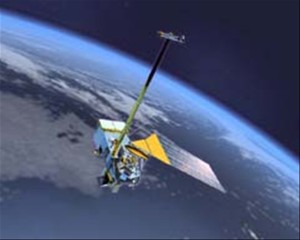5 June 2007
Falling Behind in Climate Research
Posted by Dan Satterfield
Our 6pm producer came back to the weather office this afternoon to ask me about a story on the wire about major cuts in the polar orbiting weather satellite program. I was unfortunately very familiar with the problems.
The National Polar Orbiting Environmental Satellite System (NPOESS) provides a ton of data for researchers and weather forecasters like myself.
You have seen these images on my weathercasts many times. While most of the satellite pictures you see on TV weathercasts are from the much higher GOES satellites, the much lower NPOESS images provide very high resolution views in full colour of weather systems.
 What you do not often see is images and data from other sensors on these satellites. This data is critical to our understanding of the Earth’s heat budget. Thousands of students and researchers around the world use this data to improve the long term climate models that are so important to our understanding of climate change.
What you do not often see is images and data from other sensors on these satellites. This data is critical to our understanding of the Earth’s heat budget. Thousands of students and researchers around the world use this data to improve the long term climate models that are so important to our understanding of climate change.
I attended a couple of sessions on the NPOESS problems back in January at the annual meeting of the American Meteorological Society. These meetings were packed with stunned scientists who were getting the bad news that many instruments that they depended on for their research would not be put onboard the next generation of satellites because of budget cuts.
There are strong rumors that the program has been mismanaged. One researcher told me it was “Badly mismanaged”. Frankly, I am not close enough to these programs to know whose fault (If any) that is.
There is definitely an overall feeling in the science community that the United States is no longer the leader in Earth Observation research. The European Union has plans for several satellites that will have these sensors so hope is not lost.
However, As a local scientist told me today, the students and their tuition will go to the universities in the counties that pay for this data…and that will be Europe.
Before you make up your mind on whether this research is worth the taxpayer money it will cost…spend some time to understand it.
Here is a link to more information on the NPOESS program:


 Dan Satterfield has worked as an on air meteorologist for 32 years in Oklahoma, Florida and Alabama. Forecasting weather is Dan's job, but all of Earth Science is his passion. This journal is where Dan writes about things he has too little time for on air. Dan blogs about peer-reviewed Earth science for Junior High level audiences and up.
Dan Satterfield has worked as an on air meteorologist for 32 years in Oklahoma, Florida and Alabama. Forecasting weather is Dan's job, but all of Earth Science is his passion. This journal is where Dan writes about things he has too little time for on air. Dan blogs about peer-reviewed Earth science for Junior High level audiences and up.